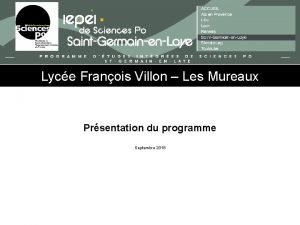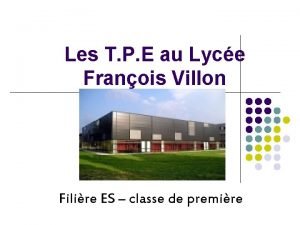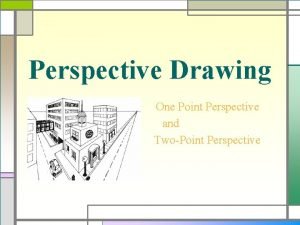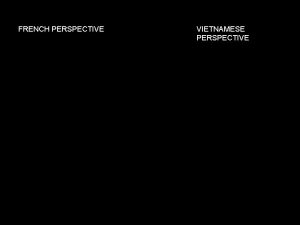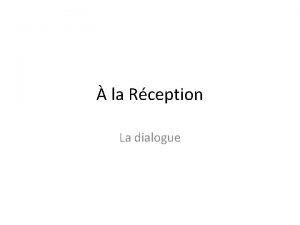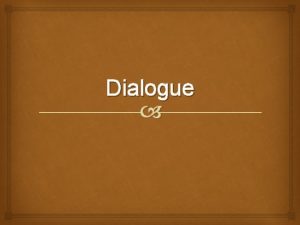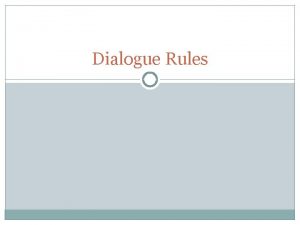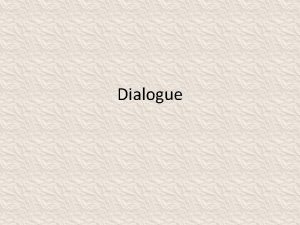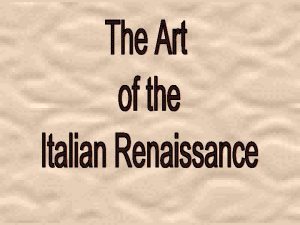Competitive dialogue a French perspective Franois Lichre Professor











- Slides: 11

Competitive dialogue – a French perspective François Lichère Professor of public law University of Aix-Marseille

Introduction n Competitive dialogue (CD) has been the only new award procedure introduced with the last reform of the directives on public procurement (2004) namely the Directive 2004/18 on public sector contracts n The directive 2004/17 on utilities contracts does not encompass such a procedure as it permits the free use of negotiated procedure n CD bridges the gap between open and restricted procedures which do not allow negotiations and the negotiated procedure n France has used the CD on many occasions

1. Scope of application 1. 1 Free recourse to competitive dialogue below the European thresholds n Different thresholds regarding works or services q q n Examples of use of CD : computer services ; tax collection services and PPPs for works The way the value is calculated can in theory have an impact on the ability to use CD ; less impact in practice (big projects at stake) Different ways of calculating the estimated value in different Member States

1. Scope of application 1. 2 The conditions of complexity above the European thresholds n Alternative conditions : public contractors: q q “Are not objectively able to define the technical means in accordance with Article 23(3)(b), (c) or (d), capable of satisfying their needs or objectives, and/or Are not objectively able to specify the legal and/or financial make-up of a project”

1. Scope of application n Very few challenges in France regarding these conditions as opposed to numerous challenges regarding the award procedures q q q The reason can be found in the need for flexibility that firms support ; the existence of a previous similar award procedure (call for performance) ; the advice of the official experts for PPPs (MAPPP) that would « secure » the recourse of CD At least one case has led the court to conclude that there was a technical complexity No case law regarding the financial and legal make up of the contract

1. Scope of application n The flexible interpretation of the scope in theory and in practice q In theory: although an exception, competitive dialogue can be justified on several occasions n n n q CD really is an exception to open and restricted procedures French statute law: inability for the public contractor to define the means alone and in advance / objective lack of knowledge? Examples of technical complexity and financial complexity in legal literature In practice: n The positive attitude of the MAPPP q q n Statistics: CD used in almost 90 % of the PPP projects and very few negative opinions by the MAPPP Question: lack of objectivity by the MAPPP? The possibility of setting up a complex project

2. The operation of the award procedure: main issues 2. 1 The ability to exclude a candidate during the dialogue phase n The ambiguous wording of the directive: ability to reduce « solutions » n The inability to ask a candidate to submit a final offer different from his solutions q q The risk of cherry picking The use of award criteria

2. The operation of the award procedure: main issues 2. 2 The ability to adapt the award procedure during the dialogue phase n The adaptation of the award criteria q q n An explicit possibility set by the statute law on PPPs A restrictive interpretation by the case law of the Conseil d’Etat-CE 24. 11. 2004 The adaptation of requirements: a flexible interpretation for CD-CE 24. 6. 2011

2. The operation of the award procedure: main issues 2. 3 The question of post tender modifications n The possibility to confirm commitments q q q n Purpose: avoid costly financial proposals Uncertainty : is a partial tender possible? Is a new offer possible? The solution: generalisation of compensations as it is the case in France for PPPs with « significant investments by the candidates » The possibility to clarify aspects of the tender

2. The operation of the award procedure: main issues 2. 3 The question of confidentiality n Avoided in theory n Still reluctance in practice

Conclusion n n CD has shown efficiency to adapt the demand to the offer although time consuming The operation of CD is more transparent than negotiated procedure, both in the regulations and in practice (internal competitive dialogue rules) There is still a lack of certainty for certain aspects of the scope and of the procedure The current reform could extend the scope of this procedure and use it as an example for the revision of the negotiated procedure
 Lichre
Lichre Pic franois
Pic franois Iepei lille
Iepei lille Franois villon
Franois villon Chapter 5 competitive rivalry and competitive dynamics
Chapter 5 competitive rivalry and competitive dynamics Market structure from most competitive to least competitive
Market structure from most competitive to least competitive Pharmacology introduction
Pharmacology introduction Promotion from associate professor to professor
Promotion from associate professor to professor Congratulations is an expression of
Congratulations is an expression of Professor chris french
Professor chris french One point perspective hallway
One point perspective hallway Silo perspective vs business process perspective
Silo perspective vs business process perspective


